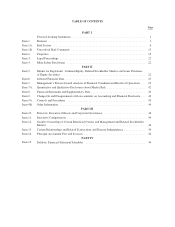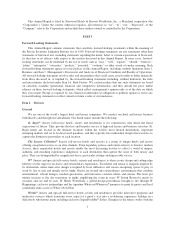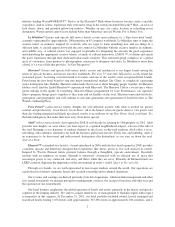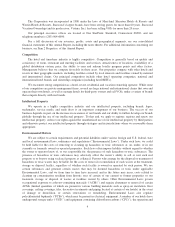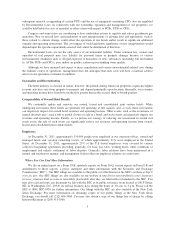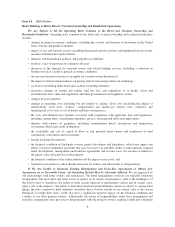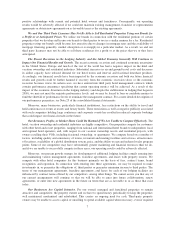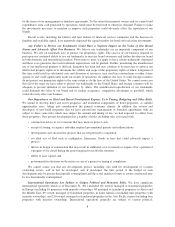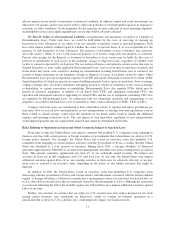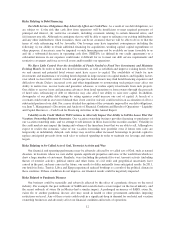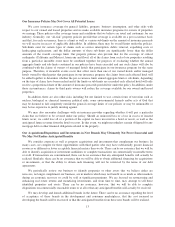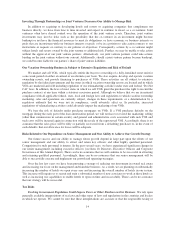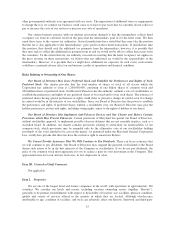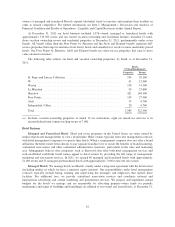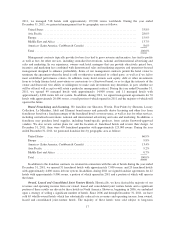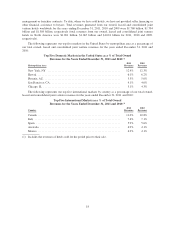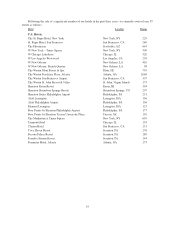Starwood 2011 Annual Report Download - page 77
Download and view the complete annual report
Please find page 77 of the 2011 Starwood annual report below. You can navigate through the pages in the report by either clicking on the pages listed below, or by using the keyword search tool below to find specific information within the annual report.geopolitical, and other risks that are not present in U.S. operations. These risks include exposure to local
economic conditions, potential adverse changes in the diplomatic relations between foreign countries and the
United States, hostility from local populations, including the risk of war and civil unrest, restrictions on the
repatriation of non-U.S. earnings and withdrawal of foreign investments, restriction on the ability to pay
dividends and remit earnings to affiliated companies, uncertainty as to the enforceability of contractual rights
under local law, conflicts between local law and United States law and compliance with complex and changing
laws, regulations and policies. In addition, sales in international jurisdictions typically are made in local
currencies, which subject us to risks associated with currency fluctuations. Currency devaluations and
unfavorable changes in international monetary and tax policies could have a material adverse effect on our
profitability and financing plans, as could other changes in the international regulatory climate and international
economic conditions.
Additionally, our current growth strategy is heavily dependent upon growth in international markets. As of
December 31, 2011, 85% of our pipeline represented international growth. Further, 61% of our pipeline
represents new properties in Asia Pacific and 44% represents new growth in China alone. If our international
expansion plans are unsuccessful, our financial results could be materially adversely affected.
We Could be Adversely Affected by Violations of the U.S. Foreign Corrupt Practices Act. Our business
operations in countries outside the United States are subject to anti-corruption laws and regulations, including
restrictions imposed by the Foreign Corrupt Practices Act (“FCPA”). The FCPA and similar anti-corruption laws
in other jurisdictions generally prohibit companies and their intermediaries from making improper payments to
government officials for the purpose of obtaining or retaining business. We operate in many parts of the world
that have experienced governmental corruption to some degree and, in certain circumstances, strict compliance
with anti-corruption laws may conflict with local customs and practices. We train our employees concerning anti-
corruption laws and issues, and also require our third-party business partners and agents and others who work
with us or on our behalf that they must comply with our anti-corruption policies. We also have procedures and
controls in place to monitor internal and external compliance. We cannot provide assurance that our internal
controls and procedures will always protect us from the reckless or criminal acts committed by our employees or
third parties with whom we work. If we are found to be liable for violations of the FCPA or similar anti-
corruption laws in international jurisdictions, either due to our own acts or out of inadvertence, or due to the acts
or inadvertence of others, we could suffer from criminal or civil penalties which could have a material and
adverse effect on our results of operations, financial condition and cash flows.
Third Party Internet Reservation Channels May Negatively Impact Our Bookings. Some of our hotel
rooms are booked through third party internet travel intermediaries such as Travelocity.com®, Expedia.com®,
Orbitz.com®and Priceline.com®. As the percentage of internet bookings increases, these intermediaries may be
able to obtain higher commissions, reduced room rates or other significant contract concessions from us.
Moreover, some of these internet travel intermediaries are attempting to commoditize hotel rooms by increasing
the importance of price and general indicators of quality (such as “three-star downtown hotel”) at the expense of
brand identification. Over time consumers may develop loyalties to these third party internet reservations
systems rather than to our lodging brands. Although we expect to derive most of our business from traditional
channels and our websites, if the amount of sales made through internet intermediaries increases significantly,
our business and profitability may be significantly harmed.
A Failure to Keep Pace with Developments in Technology Could Impair Our Operations or Competitive
Position. The hospitality industry continues to demand the use of sophisticated technology and systems including
technology utilized for property management, brand assurance and compliance, procurement, reservation
systems, operation of our customer loyalty program, distribution and guest amenities. These technologies can be
expected to require refinements, including to comply with the legal requirements such as privacy regulations and
requirements established by third parties such as the payment card industry, and there is the risk that advanced
new technologies will be introduced. Further, the development and maintenance of these technologies may
require significant capital. There can be no assurance that as various systems and technologies become outdated
or new technology is required, we will be able to replace or introduce them as quickly as our competition or
within budgeted costs and timeframes. Further, there can be no assurance that we will achieve the benefits that
may have been anticipated from any new technology or system.
9



